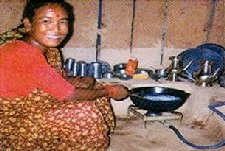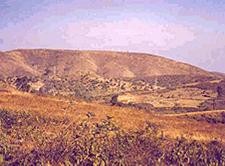Despite the current international efforts to reduce the driving forces of global climate change, the process is not likely to be halted anytime soon. The poorest groups, with least responsibility for the change, are likely to become its main victims. Increasing their resilience to impacts of this through adaptation efforts is an absolute must. Given recent scientific certainty that global climate change is already starting to occur, it is also becoming extremely urgent. Till now, most of the revenues accruing due to the international carbon trading mechanisms have accrued to the industrial sector. Very few projects involve use of these funds for promoting development in the rural areas, which are likely to suffer more from climate change as their livelihoods primarily depend on climate sensitive sectors (e.g agriculture, fishery etc). This article provides an overview of few of the projects that directly benefit vulnerable communities along with satisfying the agenda of mitigation of climate change. India: EmPower Partnership Project Under this project of Decentralised Energy Systems (India) Pvt. Ltd, 100 small biomass gasifier based power plants will be linked to energy services and micro industries, all owned by village cooperatives. These 100 kW plants will each create at least 50 direct and indirect jobs in each village and eradicate the poverty of the participating families. Half a million tonnes of CO2 savings will accrue over a period of 10 years from the programme. The money will provide individual village communities with the start-up capital for their EmPower Partnership project. Nepal: Biogas Project The Biogas project aims to develop biogas use as a commercially viable, market-oriented industry in Nepal by bringing fuel for cooking and lighting to rural households. Between 2004 and 2009, the project functionaries will install 162,000 quality-controlled, small-sized biogas plants.
These biogas plants will displace traditional fuel sources for cooking - fuel wood, kerosene, and agricultural waste - and introduce a proper treatment of animal and human wastes as well as produce a high quality organic fertilizer. The project will generate a total of approximately 6.5 million Mt CO2e during the crediting period of ten years. Carbon credits will be used to reduce the dependency on subsidies which has been a key element in making these biogas plants accessible to poor households. South Africa: Energy Efficient Lighting in Low income households The project seeks to install 20,000 energy efficient Compact Fluorescent Lamps (CFLs) in place of traditional incandescent lamps in low income households in South Africa. The use of Compact Fluorescent Lamps will reduce the lighting energy load and will reduce Carbon Dioxide emissions. The CO2 reduction is 289 tonnes over the life of 1000 lamps. The carbon revenues will be used to meet the initial capital costs of replacing the lamps as well as for managing a revolving fund to subsidise the CFLs to avoid the customers reverting back to incandescents after the life of the CFL. The households benefit by saving energy costs. Moldova Soil Conservation Project Moldova is the poorest country in Europe with more than three-quarters of its land under agriculture and most of the population living in rural areas. Large areas of agricultural land have been lost due to landslides. One measure to stop this is reforestation and afforestation. Carbon revenues ( from 1.8 million tonnes of CO2 ) have been used to restore the productivity of 14,500 hectares of degraded agricultural lands for rural communities and to build the community capacity to manage 5,400 hectares of these lands. Planting degraded pasturelands with tree and shrub species adapted to adverse conditions such as poor soils and erosion will provide the urgently needed fuel wood and timber to rural communities. India: Rural Livelihoods Project The project will develop 3,500 ha of tree plantations in the states of Orissa and Andhra Pradesh. The plantations will be realized by small and marginal farmers on their private lands. Farmers have been organizsed into a cooperative to increase their representation and negotiation power, and will individually sign buy back contracts with an industrial partner from the paper industry, JK Paper Mills Ltd. The partner will provide short term credit to farmers, notably in the form of subsidized planting material, for up-front investment costs, and will commit to purchase the timber. The project is expected to sequester 0.27 - 0.64 Mt CO2e by 2017. The additional income stemming from this carbon sequestration will provide the necessary incentive needed for the realization of these plantations. The rarity of such projects clearly shows a need for ground level organizations to take a lead in designing such projects and presenting the vulnerable communities with context specific options and opportunities for adaptation using international carbon funds. Using the wealth generated from carbon credits to catalyse development in the host communities can surely be an option to generate genuine, sustainable growth and empower communities to choose healthy development and clean energy options.q |

